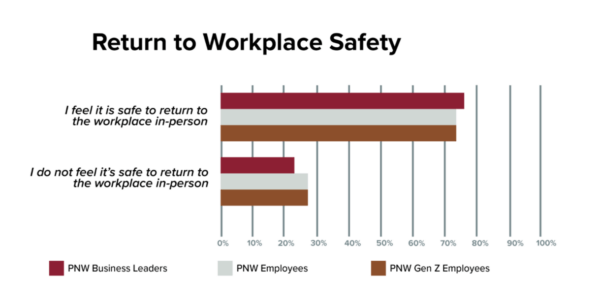Employees’ changing expectations on returning to the office, Meta’s attempt to redefine its values and more
Get tips on building your professional network, along with our weekly roundup of uplifting stories for a little inspiration.

Hello there, comms pros.
Let’s explore some notable stories from Feb. 14-18, 2022—and extract a few useful messaging takeaways along the way:
1. More employees are comfortable returning to the office.
Results from an annual study by Washington State University’s Carson College of Business shows employees say remote work is having a negative impact on collaboration, teamwork and even communication.
COVID-19 is becoming less of a concern to employees who are eager to return to in-person work. New Morning Consult data reveals 68% of working adults would feel comfortable returning to the office as soon as next week. That’s the highest point reported since the first week of November 2021.
The Carson College of Business reports similar numbers, with more than 70% of business leaders, employees and Gen Z workers in the U.S. Pacific Northwest (PNW) saying they’d feel safe going back to work in person.

At the same time, employees are also eager to retain the flexibility that comes with working remotely or on a hybrid schedule. Seventy-five percent of PNW business leaders cite flexible work hours as the top change that has had a positive impact on morale. And a new Pew Research Center study shows that while most Americans say working from home has made them feel less connected to co-workers, nearly the exact same number say remote work makes it easier to balance work and their personal lives.
Employees want options. They want flexibility. So, if your organization does offer workers choices about where and when they can do their jobs, it’s crucial to be explicit about those choices in your messaging.
It’s time to take another look at your return-to-office (RTO) plan. Will hybrid workers be expected to work in the office a certain number of days? Are there benefits that remote workers get (i.e., WFH tech stipends) that in-office personnel aren’t eligible for, but should nonetheless be aware of?
Clear and concise language is your friend. Consider taking your company’s policy and translating it into an easy-to-read “if, then” infographic that outlines every option in every scenario. Communicating what is allowed is just as important as what isn’t allowed. Making sure your employees are aware of every possible choice in front of them is an easy way to build trust.
2. Meta’s new “metamates” message offers cautionary tale.
Meta CEO Mark Zuckerberg announced an overhaul of the company’s values earlier this week on an internal call with employees. Afterward, he shared a public post on Facebook detailing the changes—including new expectations for employees.
Among the six new values is a phrase that has been skewered on social media: “Meta, Metamates, me.”
Zuckerberg wrote that the phrase “…is about being good stewards of our company and mission. It’s about the sense of responsibility we have for our collective success and to each other as teammates. It’s about taking care of our company and each other.”
The mantra is a spin off the U.S. Navy’s expression, “ship, shipmates, self,” which represents the idea of service to a greater good than oneself. Makes sense when you’ve committed yourself to a mission that could very well result in loss of life and limb, but perhaps is out of place when clocking in for a social media company.
The New York Times reports that Meta employees’ reactions to the new values ran the gamut from excitement to ridicule:
On some internal forums, hundreds of employees welcomed the changes with heart emojis. Yet in private chat messages, away from the eyes of managers, some workers expressed more skepticism.
“How is this going to change the company? I don’t understand the messaging,” one engineer wrote in a private chat viewed by The New York Times. “We keep changing the name of everything, and it is confusing.”
Another employee said being a Metamate reminded him of sailing. “Does this mean we are on a sinking ship?” the worker wrote.
Others said the new slogans had a “military inspiration” or gave a sense of being “a cog in a machine,” according to employee posts reviewed by The Times. And on Twitter, one Meta employee made fun of the new values, replacing them with “conform” and “obey.” He quickly deleted the message.
“Cog in a machine” is a sentiment that most internal communicators would see as a disaster for their messaging efforts. Meta’s newest mantra puts employees not only third—behind the company and other workers—but last.
As the world faces a third year of the COVID-19 pandemic, comms pros and the leaders they advise must recognize the sacrifices many workers have already made to keep doors open and systems running. The Great Resignation has proven that employees are willing to abandon the ship—regardless of their love for their shipmates—if they don’t feel valued or cared for by their employers.
3. Build your professional connections with easy networking tips.
Having trouble figuring out your next career move? Feeling stuck or professionally uninspired?
There are plenty of ways to refresh your work life, but networking remains one of the top tactics to obtain new perspectives and advice about your professional path.
“Especially for communicators, finding time for connection right now is more important than ever,” writes Mary Olson-Menzel, career coaching expert. “Connecting with people that can help you and vice versa is something that you can (and should) be very intentional about.”
Morning Brew shared some insightful tips about how to build a meaningful, diverse network on its business education account:
https://twitter.com/LearningBrew/status/1493988103870103552
Morning Brew is right—constructing an echo chamber of sorts will do nothing to advance your professional mindset or comms skills.
https://twitter.com/LearningBrew/status/1493988109146632200
The thread includes advice on how to take stock of your existing network, examine which skills or industries are underrepresented and use that information to build a network that will work for you.
Olson-Menzel suggests “power networking,” which entails at least one weekly 15-minute phone call with someone you’d like to reconnect with–perhaps a mentor, former colleague or industry expert.
Try these networking tips on for size:
- Seek out new connections whose personal and professional backgrounds are different than yours.
- Get a referral—ask a friend to introduce you to a connection they’ve found valuable.
- Attend industry-specific networking events.
- Connect with new faces and voices through a virtual professional development program.
4. How about some good news?
This week, let’s draw inspiration from:
- How scientists have used a novel treatment to potentially cure a woman of HIV.
- A formula for happiness later in life.
- How international pop star Justin Bieber almost single-handedly saved Tim Hortons.
- Ragan Training, which is an incredible resource for communication inspiration and education. You also deserve an award. Get your due here!
Take good care of yourselves, comms champions. And keep up the good work.







